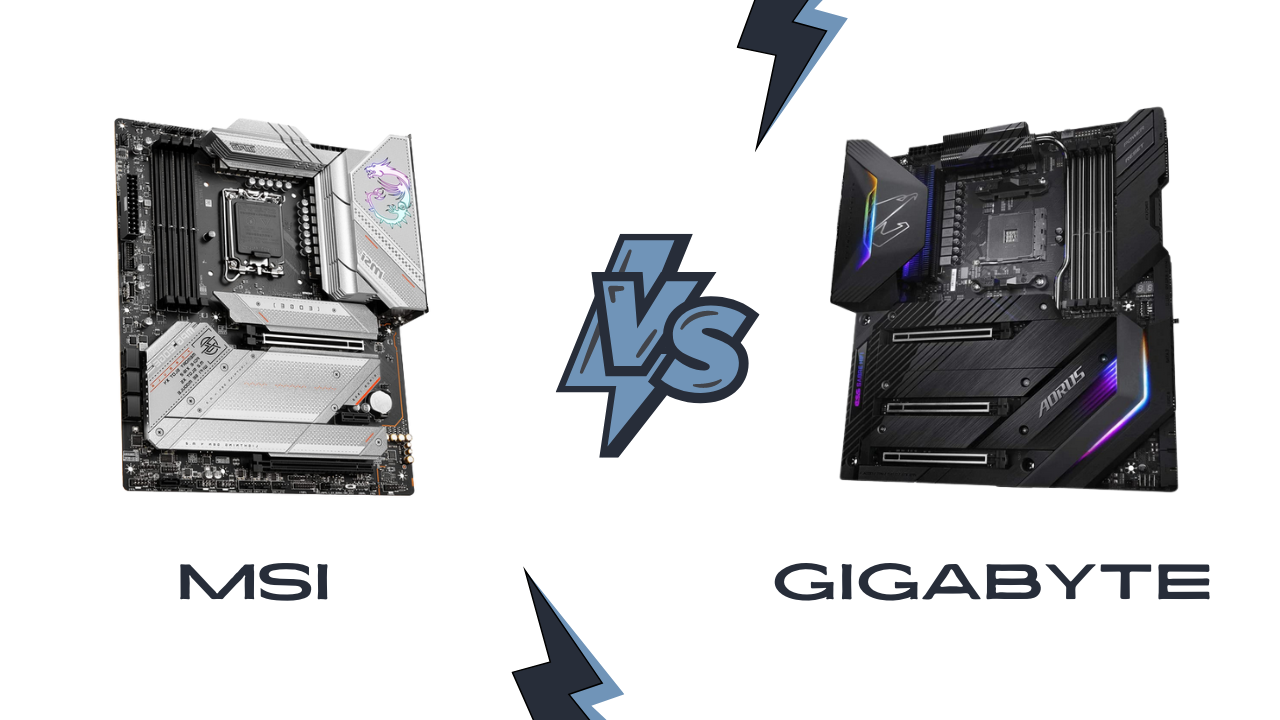
Selecting the right motherboard is crucial to upgrading or building a new gaming PC. Choosing between two of the best brands on the market, MSI and Gigabyte, can be difficult. In this blog post, we will provide a detailed review of MSI vs Gigabyte motherboard, taking into account factors such as compatibility, performance, design, and features. We will also provide tips and tricks to help you decide which motherboard is right for you. Read on to find out more!
MSI and Gigabyte are two of the leading manufacturers of motherboards for personal computers, providing a variety of options for users. MSI has been in the business for over 30 years, with its product line-up ranging from entry-level to enthusiast-grade motherboards. Meanwhile, Gigabyte offers an even wider range of products, from entry-level to high-end and server-grade motherboards.
Both brands feature innovative technologies and designs that offer reliable performance and great value for the money. It is worth noting that both manufacturers have achieved recognition for their excellent customer service and support, with both offering extended warranties for their products.
Also Read: MSI Vs ASUS Motherboards
MSI Vs Gigabyte Motherboard: Key Features
| Features | MSI Motherboards | Gigabyte Motherboards |
|---|---|---|
| Memory Support | DDR5, Max memory capacity up to128GB | DDR5, Max memory capacity up to128GB |
| Chipset | Intel Z790, AMD X670 | Intel Z790, AMD X670 |
| OS | Windows® 11 64-bit, Windows® 10 64-bit | Windows® 11 64-bit, Windows® 10 64-bit |
| Over-Clocking | 7600+(OC) MHz | 8000+(OC) MHz |
| Connection | USB 3.3 Gen 2×2 Type-C | USB 3.3 Gen 2×2 Type-C |
| Network Connectivity | Wi-Fi 6E, 2.5Gbps LAN, Bluetooth® 5.3, FIPS, FISMA | Intel® Killer™ Wi-Fi 6E AX1690, 10GbE LAN chip , 2.5Gbps LAN, Supports Bluetooth® 5.3 |
| Audio | Realtek® ALC4080 Codec | Realtek® ALC4082 Codec + ESS ES9280AQ Combo DAC/HPA |
| Connectivity | PCIe 5.0 slot, Lightning Gen 5 x4 M.2, USB 3.2 Gen 2×2 | Gen PCIe 5.0 slot, M.2 slots, USB 3.2 Gen 2×2 |
| Onboard Graphics | HDMI 2.1 with HDR 4K 60Hz | Integrated Graphics Processor+ Intel® Thunderbolt™ 4 Controller |
| Power Design | 19+1+1 phases power | 20+1+2 Phases Digital VRM Solution |
| Thermal Solution | Heatsink with heat-pipe, MOSFET thermal pads, choke thermal pads, and M.2 Shield Frozr |
Xtreme Thermal Design, Fins-Array III, M.2 Thermal Guard Xtreme II, Smart Fan 6 |
MSI Vs Gigabyte Motherboard: Recommendations
MSI Vs Gigabyte Motherboards: MSI Motherboards
| Design | Model | Retailer |
|---|---|---|
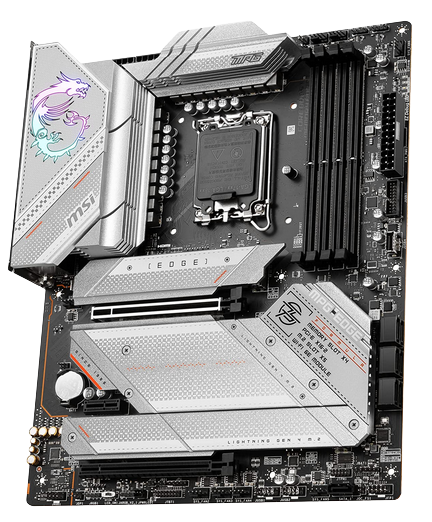 |
MSI MPG Z790 EDGE Wi-Fi Gaming Motherboard | Check Price |
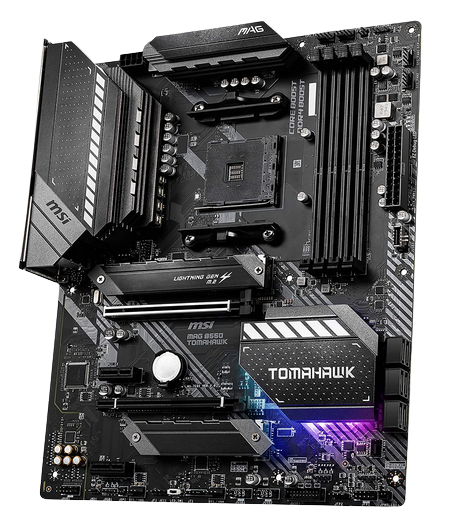 |
MSI MAG B550 TOMAHAWK Gaming Motherboard | Check Price |
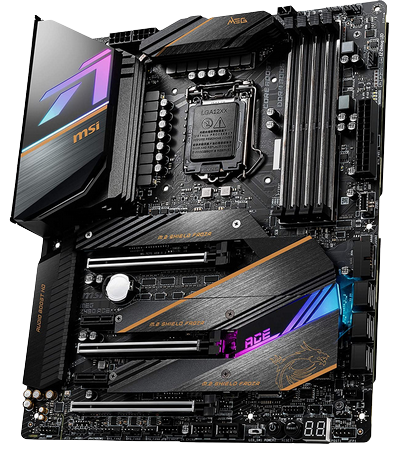 |
MSI MEG Z490 ACE Gaming Motherboard |
Check Price |
MSI Vs Gigabyte Motherboards: Gigabyte Motherboards
| Design | Model | Retailer |
|---|---|---|
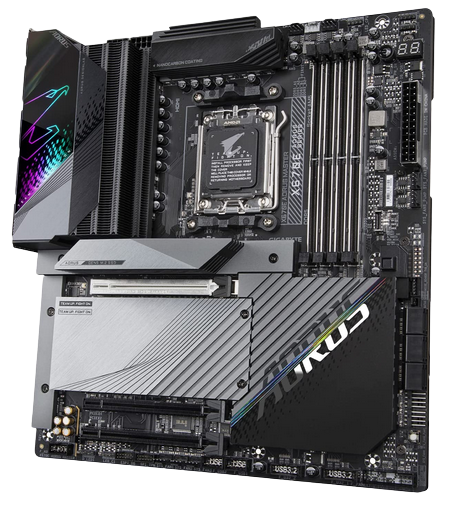 |
GIGABYTE X670E AORUS Master | Check Price |
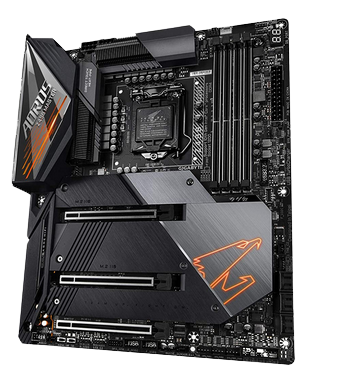 |
GIGABYTE Z490 AORUS Master | Check Price |
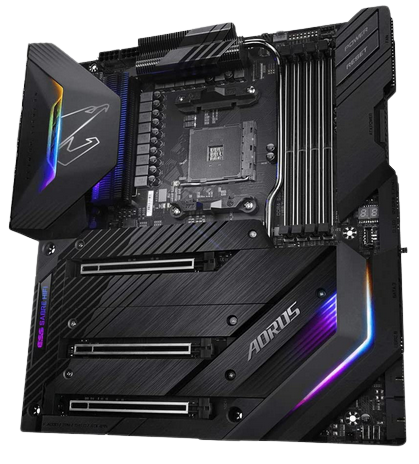 |
GIGABYTE AORUS XTREME |
Check Price |
MSI Vs Gigabyte Motherboard: Detailed Comparison
Specifications
| MSI motherboards use Intel’s LGA (Land Grid Array) and AMD’s sTRX5 sockets. The latest Intel CPUs use LGA1700 and 1200, while the latest AMD CPUs use the sTRX5 socket. MSI has older sockets, such as LGA1151, 1150, and 1155. | Gigabyte motherboards use Intel’s LGA and AMD’s sTRX5 sockets. Intel CPUs have LGA1700, 1200, 1150, and 1151 sockets. AMD, they have the sTRX5 socket. They also have older sockets like the LGA775 for Intel and sTRX3 for AMD. |
| MSI offers Intel Z390, H370, B360, H310 and AMD B450, X470 and X570 chipsets. | Gigabyte also offers Intel Z390, H370, B360, and H310 chipsets and AMD B450, X470, X570, and B550 chipsets. |
| MSI motherboards tend to support a wider range of memory types, including up to DDR5 7600(OC). | Gigabyte motherboards typically support up to DDR5 8000(OC). |
| Most current MSI motherboards feature PCIe slots compatible with the latest graphics cards. | Gigabyte motherboards tend to offer a wider range of expansion slots, including PCI-E 5.0, SATA 3.0, and M.2 slots. |
| MSI motherboards come with up to 10 SATA 6 Gb/s ports, 2 M.2 slots, and support RAID 0,1,5,10. This allows users to connect multiple storage devices to the motherboard and enjoy higher speeds when transferring data between them. | Gigabyte motherboards provide up to 8 SATA 6 Gb/s ports, 2 M.2 slots, and support RAID 0,1,5,10. While they do not have as many SATA ports as MSI motherboards, they still provide plenty of connectivity options for users. The M.2 slots on Gigabyte motherboards also support PCIe 5.0 and thus offer good performance when dealing with large amounts of data. |
I/O and network connectivity
Regarding I/O and network connectivity, MSI and Gigabyte motherboards offer a wide range of options. Both offer various USB ports and HDMI, DisplayPort, and Ethernet ports. They also offer Wi-Fi and Bluetooth support, allowing users to connect easily to the internet or other wireless devices.
Both MSI vs Gigabyte motherboard feature support for multichannel memory technology, allowing multiple sticks of RAM to be used simultaneously. This can give your system an additional boost in performance, especially when running high-end applications.
When it comes to gaming, both offer support for multiple GPU configurations for better gaming performance. Additionally, both offer the ability to connect multiple peripherals such as a mouse, keyboard, and headset.
Form Factor
The form factor of the motherboard is an important consideration when selecting a motherboard. The size of the motherboard determines the number of components that can be installed and how much space is available for expansion cards.
Motherboards can be found in different form factors, like ATX, Micro-ATX, and Mini-ITX. MSI and Gigabyte offer motherboards in all of these form factors to fit various needs. Both brands offer models with various layouts and mounting options to meet your exact requirements.
Regarding raw performance, both MSI vs Gigabyte motherboards are competitive, offering fast RAM speeds and multiple M.2 slots for high-speed storage solutions. While both MSI and Gigabyte use similar processor sockets, such as LGA 1151 for Intel processors and AMD’s AM4 socket for their Ryzen processors, there may be slight differences depending on the model you choose.
Performance
The performance of both MSI and Gigabyte motherboards is excellent, with fast loading speeds and support for high-end components.
| The MSI motherboards can offer better overclocking abilities and feature options such as M.2 storage support, USB 3.1 Gen 2, and DDR4 RAM. | The Gigabyte offers motherboards with various features, such as intelligent fan control, multi-GPU support, and fast USB 3.2 ports. |
Both MSI vs Gigabyte motherboards provide excellent audio and graphics performance, with HDMI and DisplayPort connectors offering great sound and visuals.
Pricing
When comparing MSI and Gigabyte motherboards, pricing can vary widely. On the lower end spectrum the prices can vary as:
| The MSI boards can range from $200 to $800 | While the Gigabyte boards may start around $300 and go up to $1000. |
Generally, you can expect Gigabyte boards to be slightly more expensive than MSI boards due to their higher-quality components and features. However, with both brands offering a variety of models, it is important to compare each board’s features and specs to find the best one for your needs and budget.
MSI Vs Gigabyte Motherboard: Pros Ans Cons
MSI Motherboards
Gigabyte Motherboards
Which Is Better For You?
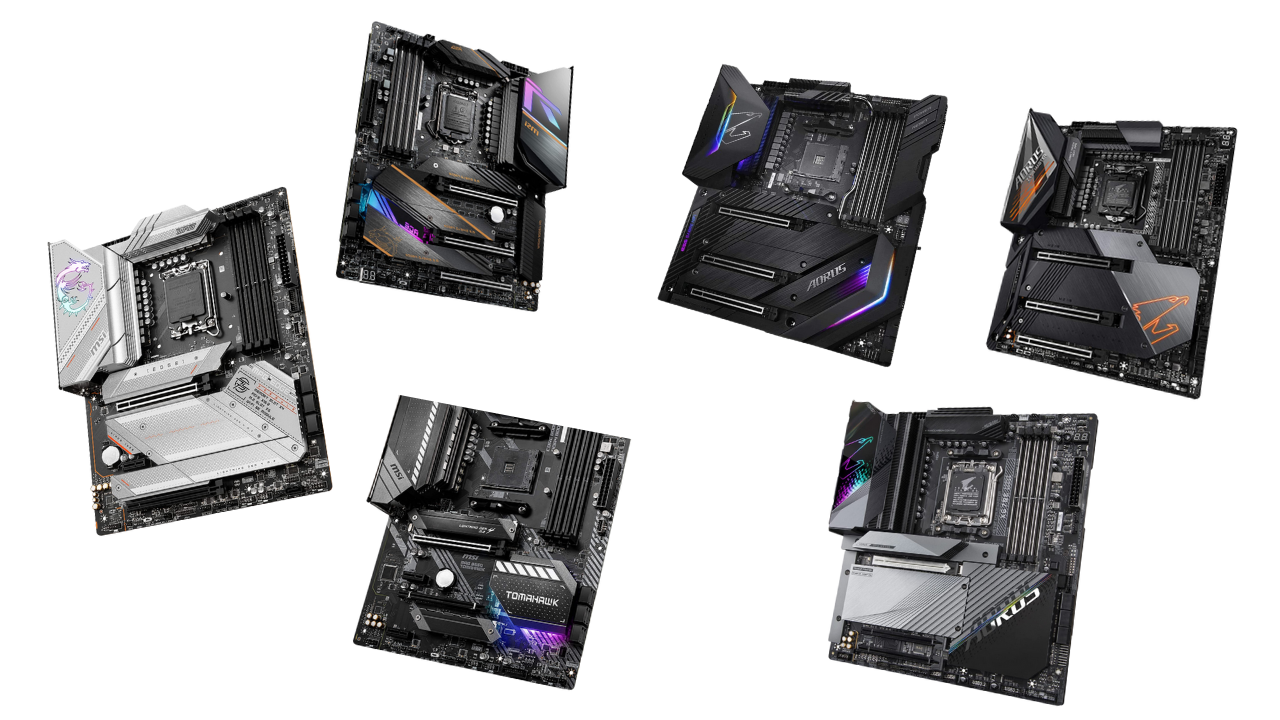
When choosing the right motherboard for your system, the choice between MSI vs Gigabyte motherboard will ultimately come down to your personal preferences and needs.
Both manufacturers offer a range of quality motherboards with great performance, so it’s important to consider what features are important for your build. MSI motherboards generally offer more extensive BIOS features and have a greater focus on gaming. In addition, their motherboards often have more RGB lighting options and overall customization options.
On the other hand, Gigabyte motherboards offer a more complete range of products, so you may find a better choice if you need certain features. Additionally, Gigabyte motherboards have better-integrated audio solutions and more comprehensive cooling solutions.
Ultimately, each manufacturer offers excellent options for building your own custom gaming computer. While MSI motherboards may offer more customizable features and performance, Gigabyte offers an impressive selection of products that can accommodate various builds. Therefore, your decision should come down to what matters most to you as a user.
Conclusion
Choosing the right motherboard for your gaming PC or workstation is critical. It’s important to consider all the factors, including form factor, socket type, chipset, memory type, storage and I/O connectivity, price, network performance, and features.
When it comes to MSI vs Gigabyte motherboard, there are advantages and disadvantages to each brand. MSI motherboards are known for their performance, ease of use, and reasonable prices. Gigabyte motherboards offer more features and options for customizing your setup but tend to be more expensive than other brands.
Ultimately, the choice between an MSI and a Gigabyte motherboard will come down to your personal needs and preferences. If you want performance and don’t mind paying a bit extra, then a Gigabyte motherboard might be the right choice. On the other hand, if you’re on a tight budget but still need quality and reliability, then an MSI motherboard might be the way to go.
Whichever option you decide on, you can rest assured knowing that both MSI and Gigabyte motherboards will offer excellent performance and reliability!